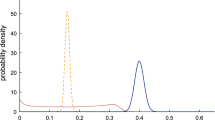Abstract
When solving scenario-based stochastic programming problems, it is imperative that the employed solution methodology be based on some form of problem decomposition: mathematical, stochastic, or scenario decomposition. In particular, the scenario decomposition resulting from scenario approximations has perhaps the least tendency to be computationally tedious due to increases in the number of scenarios. Scenario approximations discussed in this paper utilize the second-moment information of the given scenarios to iteratively construct a (relatively) small number of representative scenarios that are used to derive bounding approximations on the stochastic program. While the sizes of these approximations grow only linearly in the number of random parameters, their refinement is performed by exploiting the behavior of the value function in the most effective manner. The implementation SMART discussed here demonstrates the aptness of the scheme for solving two-stage stochastic programs described with a large number of scenarios.
Similar content being viewed by others
References
J.R. Birge, An L-shaped method computer code for multistage linear programs, inNumerical Techniques for Stochastic Optimization, Y. Ermoliev and R.J-B Wets, eds., Springer, 1988.
J.R. Birge, C.J. Donohue, D.F. Holmes and O.G. Svintsitsli, A parallel implementation of the nested decomposition algorithm for multistage stochastic linear programs, Technical Report 94-1, Department of Industrial and Operations Engineering, University of Michigan, 1994.
J.R. Birge and R.J-B Wets, Designing approximation schemes for stochastic optimization problems, in particular for stochastic programs with recourse, Mathematical Programming Study 27, 1986, 54–102.
D.R. Cariño, T. Kent, D.H. Myers, C. Stacy, M. Sylvanus, A.L. Turner, K. Watanabe and W.T. Ziemba, The Russell—Yasuda Kasai model: An asset-liability model for a Japanese insurance company using multistage stochastic programming, Interfaces 24, 1994, 29–49.
G.B. Dantzig and P.W. Glynn, Parallel processors for planning under uncertainty, Annals of Operations Research 22, 1990, 1–21.
J.H. Dula, An upper bound on the expectation of simplicial functions of multivariate random variables, Mathematical Programming 55, 1992, 69–80.
N.C.P. Edirisinghe, New second-order bounds approximations in stochastic linear programming, to appear in Operations Research.
N.C.P. Edirisinghe and W.T. Ziemba, Bounds for two-stage stochastic programs with fixed recourse, Mathematics of Operations Research 19, 1994, 292–313.
N.C.P. Edirisinghe and W.T. Ziemba, Bounding the expectation of a saddle function, with application to stochastic programming, Mathematics of Operations Research 19, 1994, 314–340.
N.C.P. Edirisinghe and W.T. Ziemba, Implementing bounds-based approximations in convex-concave two-stage stochastic programming, to appear in Mathematical Programming.
Y. Ermoliev, Stochastic quasigradient methods and their application to systems optimization, Stochastics 9, 1983, 1–36.
Y. Ermoliev and A. Gaivoronsky, Stochastic quasigradient methods and their implementation, inNumerical Techniques for Stochastic Optimization, Y. Ermoliev and R.J-B Wets, eds., Springer, 1988.
Y. Ermoliev and R.J-B Wets,Numerical Techniques for Stochastic Optimization, Springer, 1988.
K. Frauendorfer, SLP recourse problems with arbitrary multivariate distributions — the dependent case, Mathematics of Operations Research 13, 1988, 377–394.
K. Frauendorfer, SLP problems: objective and right-hand side being stochastically dependent — Part II, Manuscript, IOR, University of Zurich, 1988.
K. Frauendorfer, A solution method for nonlinear convex stochastic optimization problems, Operations Research 38, 1990, 761–769.
K. Frauendorfer,Stochastic Two-Stage Programming, Springer, Berlin, 1992.
K. Frauendorfer, Barycentric scenario trees in convex multistage stochastic programming, Manuscript, Institute for Operations Research, University of St. Gallen, 1993.
K. Frauendorfer, Multistage stochastic programming: Error analysis for the convex case, to appear in Zeitschrift für Operations Research 39/1, 1994.
K. Frauendorfer and P. Kall, A solution method for SLP problems with arbitrary multivariate distributions — The independent case, Problems of Control and Information Theory 17, 1988, 177–205.
H.I. Gassmann, MSLiP: A computer code for the multistage stochastic linear programming problem, Mathematical Programming 47, 1990, 407–423.
H. Gassmann and W.T. Ziemba, A tight upper bound for the expectation of a convex function of a multivariate random variable, Mathematical Programming Study 27, 1986, 39–53.
J.L. Higle and S. Sen, Stochastic decomposition: An algorithm for two-stage stochastic linear programs with recourse, Mathematics of Operations Research 16, 1991, 650–669.
R. Horst and H. Tuy,Global Optimization (Deterministic Approach), Springer, 1990.
G. Infanger, Monte Carlo (Importance) Sampling within a Benders decomposition algorithm for stochastic linear programs extended version: including results of large-scale programs, Technical Report SOL 91-6, Stanford University, 1991; to appear in: Annals of Operations Research.
P. Kall,Stochastic Linear Programming, Springer, Berlin, 1976.
P. Kall, On approximations and stability in stochastic programming, inParametric Optimization and Related Topics, J. Guddat, H.Th. Jongen, B. Kummer and F. Nozicka, eds., Akademie-Verlag, Berlin, 1987, pp. 387–407.
P. Kall and E. Keller, GENSLP: A program for generating input for stochastic linear programs with complete fixed recourse, Manuscript, Institut für Operations Research der Universität Zürich, Zürich CH-8006, Switzerland, 1985.
A. Madansky, Bounds on the expectation of a convex function of a multivariate random variable, Annals of Mathematical Statistics 30, 1959, 743–746.
S.M. Robinson and R.J-B Wets, Stability in two-stage stochastic programming, SIAM Journal of Control and Optimization 25, 1987.
R.T. Rockafellar and R.J-B Wets, Scenarios and policy aggregation in optimization under uncertainty, Mathematics of Operations Research 16, 1991, 119–147.
R. Van Slyke and R.J-B Wets, L-shaped linear programs with application to optimal control and stochastic optimization, SIAM Journal of Applied Mathematics 17, 1969, 638–663.
R.J-B Wets, Convergence of convex functions, variational inequalities and convex optimization problems, inVariational Inequalities and Complimentary Problems, R.W. Cottle, F. Giannesi and J-L. Lions, eds., Wiley, New York, 1980, pp. 375–403.
Author information
Authors and Affiliations
Rights and permissions
About this article
Cite this article
Edirisinghe, N.C.P., You, GM. Second-order scenario approximation and refinement in optimization under uncertainty. Ann Oper Res 64, 143–178 (1996). https://doi.org/10.1007/BF02187644
Issue Date:
DOI: https://doi.org/10.1007/BF02187644




